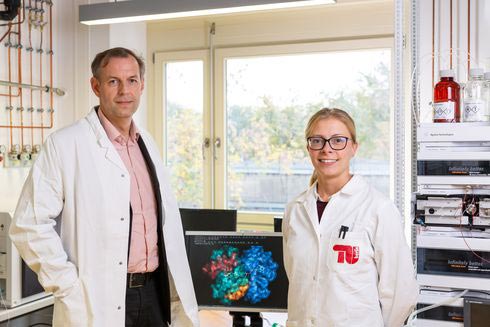

Professor Roderich Süssmuth and Maria Seidel
© TU Berlin/PR/Felix Noak
TU Berlin is to act as host university of the new “Bioactive Peptides – Innovative Aspects of Synthesis and Biosynthesis” Research Training Group (RTG2473/1).
The German Research Foundation (DFG) approved the funding of this new Research Training Group on 9 November 2018. Spokesperson will be Professor Roderich Süssmuth. The Research Training Group will conduct research in the areas of molecular biology, biochemistry, biological chemistry and bioanalytics.
Professor Süssmuth has been Rudolf Wiechert Professor of Biological Chemistry at TU Berlin since 2004, where he also heads the Chair of Biological Chemistry. The German Research Foundation will provide the Research Training Group with funding of approximately EUR 4.5 million over a period of four and a half years from 1 April 2019 until 30 September 2023. The German Research Foundation has approved a total of 15 new Research Training Groups.
In biological chemistry, biochemistry and medicinal research, natural and synthetic peptides play a significant role in the development of tools, as products of novel biosynthetic pathways and as binding partners for molecular target structures in drug search.
The various functions of peptides are in large determined by their partially complex molecular structure and their spatial folding. Research on these characteristics will form an essential part of the Research Training Group’s work.
The investigation of mechanisms of biosynthesis and their modes of actions with biological target structures represent further challenges of modern peptide research. These complex issues form the central focus of the new “Bioactive Peptides” Research Training Group.
Peptides are mostly chain-like molecules made up of between two and 100 amino acids – the building blocks of every protein in a cell. Chains made up of more than 100 amino acids are classified as proteins. As such, peptides, which are enormously diverse, can be seen as the “little brothers and sisters” of proteins. In living organisms, they not only function as biocatalysts, semiochemicals and transport substances, but also as storage materials.
Doctoral students participating in the Research Training Group will focus on peptide research via a didactically structured curriculum based on a thorough and interdisciplinary approach. The curriculum’s areas of focus are molecular biology/biochemistry, synthetic chemistry, and bioanalytics/ structural biology.
“In recent years peptide research has achieved a particular importance in academic and industrial research. Consequently, there is a growing need for knowledgeable researchers with excellent academic backgrounds who understand and can speak the language of other disciplines,” Professor Süssmuth explains.
In addition to TU Berlin, the participating institutions in the Research Training Group are Freie Universität Berlin, Humboldt Universität zu Berlin and the Forschungsinstitut für Molekulare Pharmakologie (FMP) in Berlin-Buch. The teaching staff will be supplemented by contributions from internationally renowned peptide researchers from academia and industry.
High-profile senior scientists will act as advisers within the Research Training Group. Professor Süssmuth sees the undertaking overall as a sustainable project which all participating research groups look forward to being involved in.
Image downloads:
http://www.tu-berlin.de/?201348
For further information please contact:
Prof. Dr. Roderich Süssmuth
TU Berlin
Chair of Biological Chemistry
Tel.: 030/314-24205
Email: suessmuth@chem.tu-berlin.de












